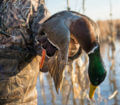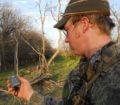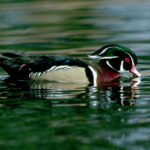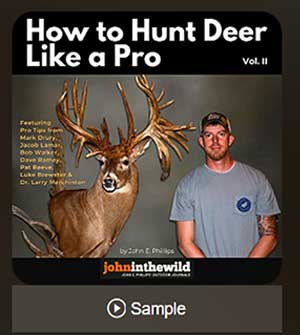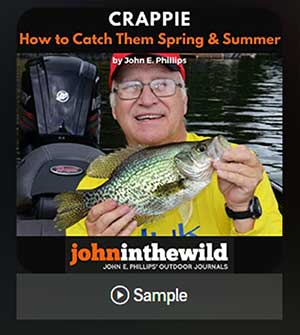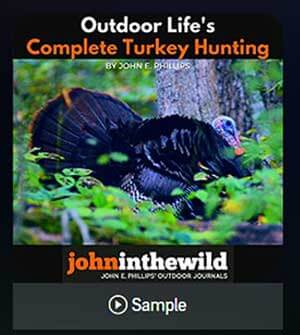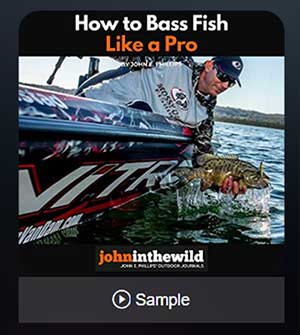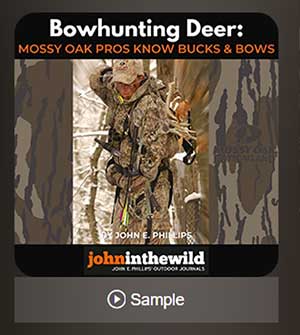John’s Note: Okay, in my opinion, I consider hunting ducks a different sport than shooting ducks. Shooting ducks means you go to a body of water, put out a bunch of decoys, have a retriever in the blind and wait for the ducks to fly by, so you can call them to within gun range. Hunting ducks involves bushwhacking them, learning where ducks live, eat and sleep and developing a stalking strategy to get in close enough to the ducks to jump shoot them when they come off the water. I’m not brazen enough to declare one technique better than the other. Actually I use both tactics throughout the season. But because duck shooting has become so sophisticated in many areas, duck hunting/ bushwhacking has begun to fade from popularity. Also, if you like to eat ducks as well as shoot ducks, there’s not a more-effective technique to bring waterfowl home for the table than bushwhacking.
 The size of the flock that you sneak-up on often determines how many flocks you’ll need to hunt to get a limit. If you can pinpoint a large flock resting and feeding later in the morning, you may get your limit from that flock without having to hunt another group of ducks. Taking more than one or two ducks out of a flight that’s resting and feeding later in the morning depends on what you do after you shoot. Generally, when you step-out from behind the tree and flush the flock, only one or two ducks will spot you. The rest of the ducks in the flight will flush because the one or two ducks that have seen you will become alarmed and leave the water. Even at the reports of the shotgun, the ducks that leave the water won’t know your position or from where the shots have come.
The size of the flock that you sneak-up on often determines how many flocks you’ll need to hunt to get a limit. If you can pinpoint a large flock resting and feeding later in the morning, you may get your limit from that flock without having to hunt another group of ducks. Taking more than one or two ducks out of a flight that’s resting and feeding later in the morning depends on what you do after you shoot. Generally, when you step-out from behind the tree and flush the flock, only one or two ducks will spot you. The rest of the ducks in the flight will flush because the one or two ducks that have seen you will become alarmed and leave the water. Even at the reports of the shotgun, the ducks that leave the water won’t know your position or from where the shots have come.
If you take ducks when they flush, mark them down. But, don’t retrieve the ducks if you haven’t finished your limit. Stay in position, reload quickly, and wait. Many times, especially with wood ducks and mallards, you’ll have ducks flying back over the jump site within 10 or 15 minutes. You may can call these birds in and shoot them as they come back in to light. But even if you don’t call the ducks, if you’ll hold your shot and let the ducks look over the feeding site for two or three passes, then most of the time, they’ll light again.
I’ll also carry a couple of lightweight blowup-type decoys in the back of my hunting coat. After I’ve flushed the ducks and shot, I often will place three or four decoys in front of the tree where I’m hiding. I’ve discovered that after the flush, when the ducks return, a small group of decoys will pull the turning ducks down to the water better than calling will. By hunting feeding sites later in the morning, you’ll locate new ducks working in and out of that feeding site, even if none of the ducks you’ve flushed have returned to feed.
 Too, hunting duck-feeding sites from about 8:00 am until about 2:00 pm doesn’t interfere with my deer hunting. If you’ve scouted, and you know where the ducks usually hold and feed in the middle of the day, and you can take your limit of ducks quickly, you’ll still have time to hunt deer, if you live in a state like my home state of Alabama, where deer season runs concurrently with duck season. You can hunt deer from daylight until about 8:00-9:00 am, get your backpack, shotgun and duck-hunting equipment and hunt ducks through the middle of the day and then return to your tree stand for an afternoon deer hunt.
Too, hunting duck-feeding sites from about 8:00 am until about 2:00 pm doesn’t interfere with my deer hunting. If you’ve scouted, and you know where the ducks usually hold and feed in the middle of the day, and you can take your limit of ducks quickly, you’ll still have time to hunt deer, if you live in a state like my home state of Alabama, where deer season runs concurrently with duck season. You can hunt deer from daylight until about 8:00-9:00 am, get your backpack, shotgun and duck-hunting equipment and hunt ducks through the middle of the day and then return to your tree stand for an afternoon deer hunt.
Why Bushwhack Ducks Early and Late:
Duck hunters know ducks move early and late. But, the best-informed duck hunters also understand where the ducks will fly in to feed at daylight, and where the ducks will come in to roost at dark. Always wear an accurate wristwatch, so you’ll recognize official sunrise and sunset times. I won’t hunt early or late without wearing a SOSpenders Personal Flotation Device (PFD), available on several websites. Remember creeks and branches create backwater sloughs and little ponds in the woods away from the main river channel. When you wade around to retrieve your ducks, you may step into one of those creek channels and go under water. Wearing those lightweight, SOSpenders not only will save your life, but also make getting back to a solid bottom much easier and quicker. Often I take a belly boat with me to float deeper areas and bushwhack ducks.
 To learn some recipes for preparing ducks for the table, go to “The Best Wild Game & Seafood Cookbook Ever: 350 Southern Recipes for Deer, Turkey, Fish, Seafood, Small Game and Birds” at http://amzn.to/WkbLRg. For more information on hunting, check out John E. Phillips’ books at www.amazon.com/author/johnephillips for print, Kindle and Audible books and www.barnesandnoble.com.
To learn some recipes for preparing ducks for the table, go to “The Best Wild Game & Seafood Cookbook Ever: 350 Southern Recipes for Deer, Turkey, Fish, Seafood, Small Game and Birds” at http://amzn.to/WkbLRg. For more information on hunting, check out John E. Phillips’ books at www.amazon.com/author/johnephillips for print, Kindle and Audible books and www.barnesandnoble.com.

